MercoPress. South Atlantic News Agency
Tag: Uruguay elections
-
Monday, March 2nd 2020 - 10:06 UTC
Government rotation in democratic Uruguay: business as usual
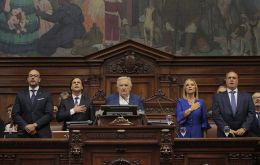
It was a March sunny Sunday in Montevideo, and for the solid democracy of Uruguay, business as usual. An outgoing center government was replaced by a center-right coalition that emerged victorious from the runoff last November. Despite fifteen years in office, three mandates, Luis Lacalle Pou, 46, is the new president for the next five years and for the first time with a woman vice president, notary Beatriz Argimón.
-
Monday, November 25th 2019 - 09:59 UTC
Uruguay's presidential runoff results delayed because of the very tight results
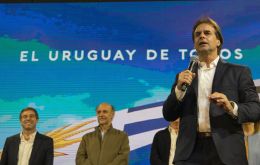
Uruguay Sunday's presidential runoff results have been so tight that the Electoral Court will only make a definitive announcement sometime late this week after it has completed counting all votes, including some 34.000, classified as “observed”. This is because the difference between the two candidates is some 29.000 votes.
-
Tuesday, November 19th 2019 - 23:41 UTC
Uruguay presidential elections: Lacalle Pou would widely win, according to polls
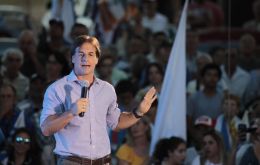
After a long election campaign, Uruguayans live the last days before the second round of the presidential elections, which will take place on Sunday, November 24. The latest polls before the ballotage positions the nationalist Luis Lacalle Pou as the next president of the country, breaking the hegemony of the left that the Frente Amplio (Broad Front) imposed in the last 15 years.
-
Saturday, November 16th 2019 - 09:41 UTC
Uruguay election runoff: “Game over, I'm the boss”, Mujica tells the incumbent candidate

Next 24 November Uruguayans will cast their runoff ballot to elect the next president, scheduled to take office in March 2020. The dispute is between the two winners of the first round on 27 October, the candidate from the ruling coalition that has enjoyed fifteen years in office, and the leader of the opposition who has managed to conform a working “multicolor” majority in the next Legislative, and is ahead in opinion polls tendencies.
-
Thursday, November 14th 2019 - 09:57 UTC
Uruguay presidential debate focused on economy and security ahead of the ballotage on November 24

In a tense debate a week and little of the second round of the presidential election in Uruguay, on Wednesday night the candidates offered profound differences both in terms of economy, public security and the country's positioning in foreign policy mentioning the dictatorship of Venezuela.
-
Monday, October 28th 2019 - 09:58 UTC
Winds of change in Uruguay: ruling coalition stumbles, next government will be “multicolor”

Winds of change have swept in Uruguay. After fifteen years in office, and enjoying an absolute legislative majority, the Broad Front could lose control of the Executive on 24 November, when a runoff is scheduled among the two most voted candidates this Sunday.
-
Wednesday, October 23rd 2019 - 21:54 UTC
Uruguay Sunday’s general election: To a second ballotage and without parliamentary majority
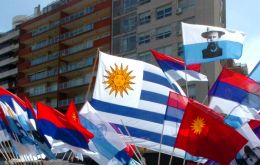
On Sunday, October 27, in Uruguay, a new president, and Parliament will be elected. According to pollsters, the same parties as in 2014, the official Frente Amplio (FA, Broad Front) and the conservative National Party, will go on second ballotage in November. However, the novelty is that the Legislature will be made up of a minimum of six parties (a historical record) and a maximum of nine.
-
Friday, September 6th 2019 - 09:55 UTC
Uruguay farmers gathered in Montevideo to protest against the government: clashes with the police

Horses, tractors and hundreds of rural producers from all over the country gathered in front of the Uruguay Parliament on Thursday to denounce the problems that the agricultural sector is experiencing and criticize the government for not listening to the proposals of the Un Solo Uruguay (One Uruguay) movement. The political, non-partisan movement brings together producers and actors of the rural environment and the interior of the country.
-
Monday, July 1st 2019 - 09:59 UTC
Uruguay: No surprises in a primary with a record of candidates
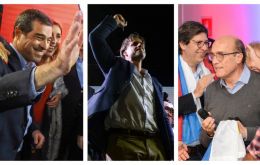
In a primary election full of new faces and overshadowed by accusations of “dirty” campaigns, there were no surprises in the results of the internal elections of Uruguay's main political parties, according to the data of the pollsters. Daniel Martínez (Frente Amplio), Luis Lacalle Pou (National Party) and Ernesto Talvi (Colorado Party) will represent the three parties with the greatest adhesion in the country, starting a new stage in the national elections in October.
-
Monday, July 1st 2019 - 09:58 UTC
Uruguay presidential election campaign takes off, following on Sunday's party primaries

A former mayor of the city of Montevideo, and a Senator, head of the opposition are the most serious candidates to be elected the next Uruguayan president according to the results of the political parties' primaries held this Sunday. General elections in Uruguay are scheduled for the end of October, and a month later a runoff in case no candidate manages a 50% majority of votes cast.
